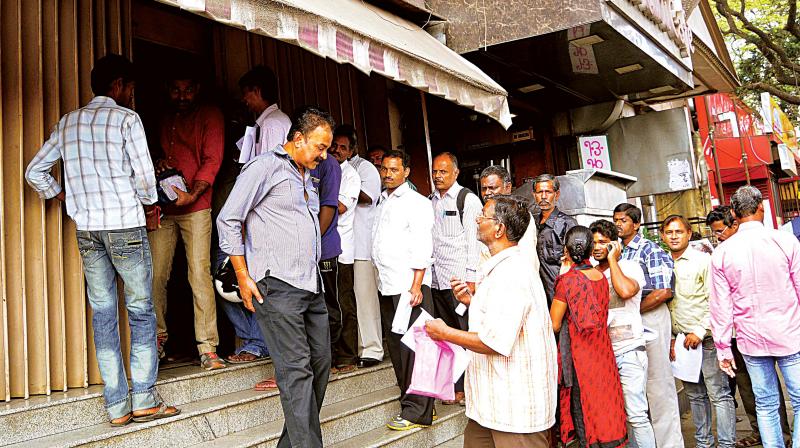Karnataka: Hawala trade, smuggling grinds to a halt

Bengaluru: Mules (couriers) from Karnataka, Tamil Nadu and Kerala, who formed the core group of the supply chain of contraband in the country, have been thrown out of jobs after with denotification of higher currency, which has also taken the wind out of the hawala, or the illegal remittance of money.
The money enters the hawala system in local currency and leaves as foreign currency at inflated and unofficial rates, which are set by the hawaladars or agents. Hawala is roughly estimated to be around 40 per cent of India’s GDP.
“All operations, which depend on illegal transaction of money, have been hit. Contraband gold, which was being smuggled into the country from Dubai, Singapore and Bangkok in the last couple of years and the ease with which it was being paid in USD at inflated rates in the black market through hawala, has stopped. No significant seizure of contraband has been reported from any part of India in the last few days. Some of it, which was in transit, has been seized and it will not be easy for smugglers to move their consignments because of ‘loss’ and non availability of currency. A lot of contraband and unaccounted money has got stuck in the illegal international trade and hawala, which operates only on trust, is hit badly. Hawala operators are in deep trouble from the law enforcement agencies and their counterparts overseas, who have paid huge amounts of money on their behalf,” said a Revenue Intelligence officer.
Last year the Directorate of Revenue Intelligence (DRI) had alone seized 144 kg of gold in Bengaluru zone, which comprises Karnataka and Kerala. One kilo of gold in open market is around Rs 30 lakh.
The illegal narcotic drugs trade has also been impacted badly with the sudden hit in the supply of black money. “Afghan heroin, which was being smuggled into India via Pakistan, has been doubly hit with tightening of border security and now demonetisation. It is now being routed to Europe via Sri Lanka and East Africa. Cocaine, which was being smuggled from South America and transited through Africa, has also suffered huge losses. “The denotification drive has dismembered smuggling, counterfeiting of currency and terror funding in one stroke,” the officer added.
Mafia making hay over money mess
Nearly a week after Prime Minister Narendra Modi demonetized Rs 500 and Rs 1,000 currency notes, Law and Parliamentary Affairs Minister T.B. Jayachandra on Wednesday said that overnight, a bank note mafia has cropped up and these people are exchanging old
Rs 500 and Rs 1,000 notes for new notes for 30-50 per cent commission. After inaugurating the Pro-Justice Forum here, he said, “Personally, I believe that demonetisation will do a lot of good for our country. But the bank note mafia will most likely adversely affect Mr Modi's plans to curb black money.”
He said, “Most of these bank note mafia members are not from this state and their bosses are operating from outside. This makes it difficult to track them down. Though Mr Modi's intentions appeared to be good when the announcement was made, the Union government should have been more careful and better prepared to handle the task of this magnitude.”
He said, “Just the announcement won't do, one needs to do proper homework to ensure a smooth implementation of such schemes. The thumb rule of implementing such schemes is to think from the poor man's perspective and not consider a rich man's views.”
Rent a place in queue
The long queues and the wait of over three hours to exchange Rs 4,500 at banks has came as a blessing in disguise for hundreds of unemployed youth, who are offering to stand- in and do the exchange for a fee of Rs 500. Their fee for collecting money from ATMs is anywhere between Rs 250 and Rs 400. Several people say they have been approached by youngsters offering to stand in the long queues on their behalf and get their old notes exchanged for the new at the banks or collect money from the ATMs. "They approach us through our maids, barbers, tailors and so on. But for this we need to pay them Rs 500 as commission,” said one resident.
Some are handing over their ATM cards with the PIN to allow the youth to draw money for them. "Most people are using their security guards for this. But it is dangerous,” said a bank officer.

